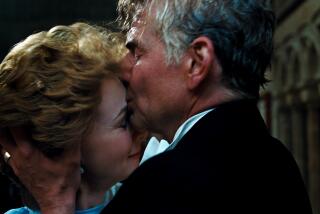‘Candide’: Bernstein’s Best Possible World
- Share via
Leonard Bernstein’s “Candide,” which first saw the light of day in 1956, has had a checkered history, to say the least. Read all about it, not here but in Andrew Porter’s thorough and engaging notes, which accompany the just-released Deutsche Grammophon recording (429 734, two CDs) of the work’s final version, conducted by the late composer.
What Bernstein committed to disc several months before his death last year is a dazzlingly rich piece of musical theater. Be forewarned, however, that, with DG’s omission of linking narrative, some motivations in the incredibly wide-ranging (geographically, among other things) “book” become cloudy.
But even when plot is obscure, character is not--as in Candide’s own impregnable idealism, the impudence of Cunegonde and the destructive optimism of Dr. Pangloss, who declares this to be the “best of all possible worlds.”
And there’s music, always music, flowing from every conceivable source--from the Viennas of Johann and Richard Strauss and of Schoenberg, in the sendup serialism of “Quiet,” from Puccini’s Italy, from Offenbach’s Paris, from Broadway--in a totality that could have come only from master mixologist Bernstein.
“Candide” always had good tunes. It now has even more through the addition of fleshed-out sketches for and numbers deleted from previous versions.
This final “Candide” is, above all, great fun. And whatever it may have lost in topicality since the McCarthy-era original--with its ham-handed political satire (one could defend paranoia in the mid-’50s; someone probably was after you) of principal writer Lillian Hellman, most of whose contribution was later jettisoned--it has gained in universality.
The various lyricists are clearly identified by DG, with Richard Wilbur given his deserved top spot. The “additional lyrics” people here are responsible not so much for creating a hodgepodge of verse styles as best-of-all-possible-worlds variety: John La Touche, Dorothy Parker, Stephen Sondheim, Hellman and LB himself.
And let’s not forget the “concept” by Voltaire, set forth in his 1759 satirical novel about the titular innocent who seeks his utopia, finds it, deems it an OK place--peaceful but toopredictable--and returns to his old neighborhood, its everyday problems and the possibility of overcoming them. In Wilbur’s final summation:
We’re neither pure nor wise nor good;
We’ll do the best we know.
We’ll build our house and chop our wood,
And make our garden grow.
DG’s cast never sounds mystified by or misplaced in the goings-on, as were some involved in the previous recording, the so-called Opera House Version of 1982, show-bizzily cobbled together under Harold Prince’s supervision and offering more gloss than Pangloss.
Tenor Jerry Hadley’s Candide is the ultimate innocent, honest and trusting to a fault, who grows into a serene maturity fed by experience. And Hadley has recaptured the youthful timbre and elegance of delivery that marked his work of a decade ago, before he assumed heavier roles that, it seemed until now, had taken a permanent toll.
June Anderson is a delectably brassy Cunegonde who understands, without exaggerating, her role as the shopworn whore with a heart of tin. Anderson fairly jumps out of the grooves (or whatever one jumps out of on CD) with a “Glitter and Be Gay” that is both in-context parody and self-sustaining coloratura showpiece.
Kurt Ollmann’s supple baritone is handsomely employed in a couple of roles, and there are endearing contributions from two operatic veterans: Christa Ludwig as the Old Lady, delivering her hilarious Tango aria in an accent reminiscent of one her friend Leonard Bernstein employed for telling dialect jokes, and Nicolai Gedda in a triple assignment that shows him, at age 66, with more marketable vocal goods than many an internationally employed tenor decades his junior.
The one piece of casting that doesn’t quite work is the Pangloss of Adolph Green, whose New York-American speech is at odds with the Doctor’s pompous dimwit-isms.
The same Green, however, makes a feast of “Words, Words, Words”--text by Bernstein, for the otherwise expendable character of Martin--through sheer intelligence. With his Pangloss, the hauteur of Max Adrian, from the 1956 original cast (excerpts are on a CBS CD), is missed.
Bernstein, who conducts an unfailingly responsive London Symphony Orchestra and Chorus, relishes his own score’s wit and shows a keen awareness of his singers’ needs--with one exception, his unsustainably slow tempo of Candide’s “It Must Be So.”
Perhaps even that will sound right with repeated listening.
More to Read
The biggest entertainment stories
Get our big stories about Hollywood, film, television, music, arts, culture and more right in your inbox as soon as they publish.
You may occasionally receive promotional content from the Los Angeles Times.










